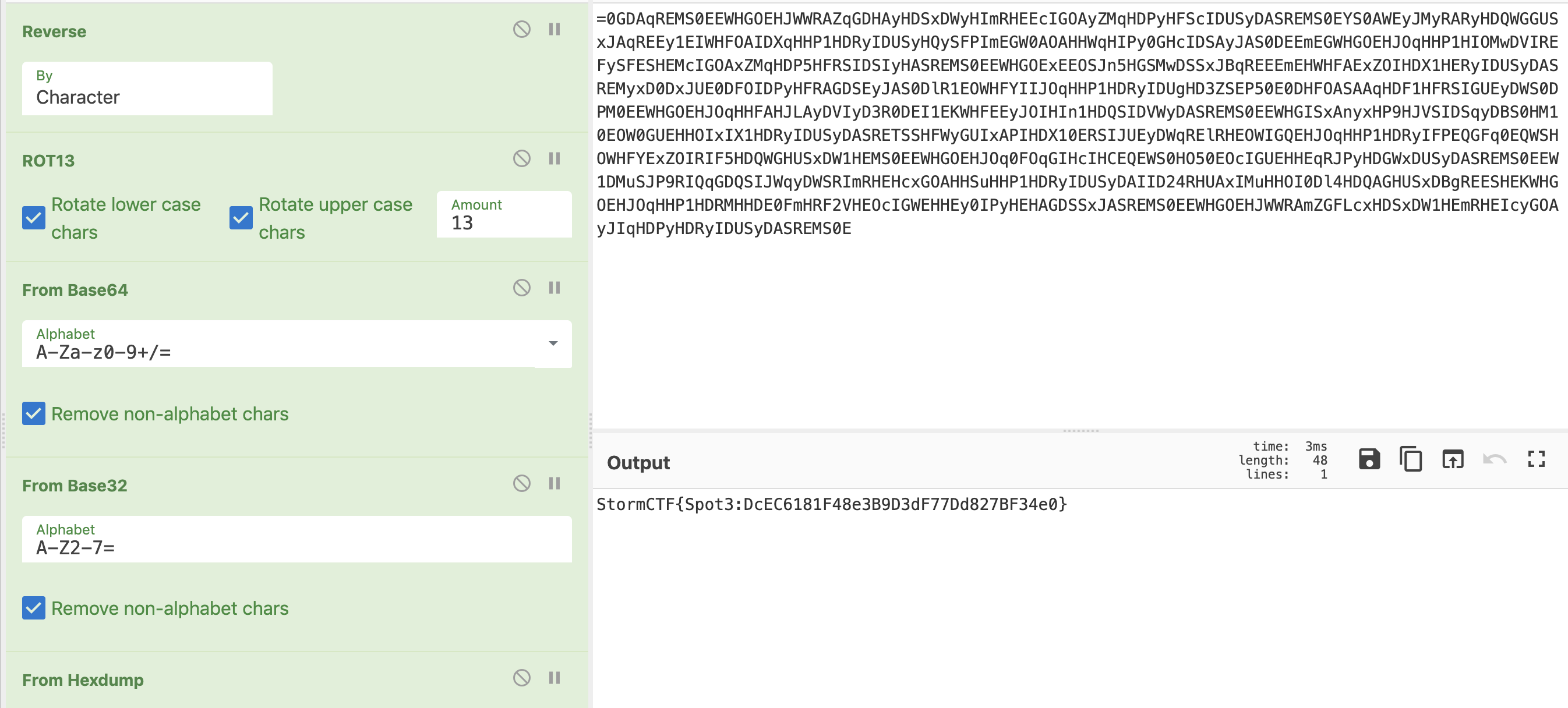

 This is equivalent to
```python
from chepy import Chepy
file_path = "/tmp/demo/encoding"
print(
Chepy(file_path)
.load_file()
.reverse()
.rot_13()
.from_base64()
.from_base32()
.hexdump_to_str()
.o
)
```
## Chepy vs Cyberchef
#### Advantages
- Chepy is pure python with a supporting and accessible python api
- Chepy has a CLI
- Chepy CLI has full autocompletion.
- Supports pe, elf, and other various file format specific parsing.
- Extendable via [plugins](https://chepy-plugins.readthedocs.io/en/latest/)
- Infinitely scalable as it can leverage the full Python library.
- Chepy can interface with the full Cyberchef web app to a certain degree. It is easy to move from Chepy to Cyberchef if need be.
- The Chepy python library is significantly faster than the Cyberchef Node library.
- Works with HTTP/S requests without CORS issues.
- `magic` support via the Chepy ML plugin.
#### Disadvantages
- Chepy does not offer every single thing that Cyberchef does
## Installation
Chepy can be installed in a few ways.
### Pypi
```bash
pip3 install chepy
# optionally with extra requirements
pip3 install chepy[extras]
```
### Git
```bash
git clone --recursive https://github.com/securisec/chepy.git
cd chepy
pip3 install -e .
# I use -e here so that if I update later with git pull, I dont have it install it again (unless dependencies have changed)
```
#### Standalone binary
One can build Chepy to be a standalone binary also. This includes packaging all the dependencies together.
```bash
git clone https://github.com/securisec/chepy.git
cd chepy
pip install .
pip install pyinstaller
pyinstaller cli.py --name chepy --onefile
```
The binary will be in the dist/ folder.
### Plugins
[Check here for plugins docs](https://chepy-plugins.readthedocs.io/en/latest/)
### Used by
[Remnux linux](https://docs.remnux.org/discover-the-tools/examine+static+properties/deobfuscation#chepy)
```eval_rst
.. toctree::
:maxdepth: 3
:caption: Contents:
usage.md
examples.md
cli.rst
chepy.md
core.md
modules.rst
extras.rst
plugins.md
pullrequest.md
config.md
faq.md
Indices and tables
==================
* :ref:`genindex`
* :ref:`modindex`
* :ref:`search`
```
This is equivalent to
```python
from chepy import Chepy
file_path = "/tmp/demo/encoding"
print(
Chepy(file_path)
.load_file()
.reverse()
.rot_13()
.from_base64()
.from_base32()
.hexdump_to_str()
.o
)
```
## Chepy vs Cyberchef
#### Advantages
- Chepy is pure python with a supporting and accessible python api
- Chepy has a CLI
- Chepy CLI has full autocompletion.
- Supports pe, elf, and other various file format specific parsing.
- Extendable via [plugins](https://chepy-plugins.readthedocs.io/en/latest/)
- Infinitely scalable as it can leverage the full Python library.
- Chepy can interface with the full Cyberchef web app to a certain degree. It is easy to move from Chepy to Cyberchef if need be.
- The Chepy python library is significantly faster than the Cyberchef Node library.
- Works with HTTP/S requests without CORS issues.
- `magic` support via the Chepy ML plugin.
#### Disadvantages
- Chepy does not offer every single thing that Cyberchef does
## Installation
Chepy can be installed in a few ways.
### Pypi
```bash
pip3 install chepy
# optionally with extra requirements
pip3 install chepy[extras]
```
### Git
```bash
git clone --recursive https://github.com/securisec/chepy.git
cd chepy
pip3 install -e .
# I use -e here so that if I update later with git pull, I dont have it install it again (unless dependencies have changed)
```
#### Standalone binary
One can build Chepy to be a standalone binary also. This includes packaging all the dependencies together.
```bash
git clone https://github.com/securisec/chepy.git
cd chepy
pip install .
pip install pyinstaller
pyinstaller cli.py --name chepy --onefile
```
The binary will be in the dist/ folder.
### Plugins
[Check here for plugins docs](https://chepy-plugins.readthedocs.io/en/latest/)
### Used by
[Remnux linux](https://docs.remnux.org/discover-the-tools/examine+static+properties/deobfuscation#chepy)
```eval_rst
.. toctree::
:maxdepth: 3
:caption: Contents:
usage.md
examples.md
cli.rst
chepy.md
core.md
modules.rst
extras.rst
plugins.md
pullrequest.md
config.md
faq.md
Indices and tables
==================
* :ref:`genindex`
* :ref:`modindex`
* :ref:`search`
```